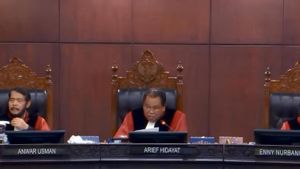JAKARTA - Senators Mark Warner and John Thune, along with a number of other senators, will unveil their latest draft law on Tuesday 7 March to grant new powers to President Joe Biden's administration. The bill has the potential to ban TikTok video apps owned by Chinese companies, ByteDance, and other applications that could pose security risks.
TikTok has been increasingly criticized for concerns that user data could fall into the hands of the Chinese government. This is thought to threaten Western security interests. TikTok CEO Shou Zi Chew is scheduled to appear before Congress on March 23, responding to the allegations.
The law is titled "Restricting the Emergency of Security Threats that Risk Information and Communications Technology (RESTRICT) Act". "This law will "comprehensively handle the continuing threats posed by technology from foreign enemies, such as TikTok," Warner's office said.
The Biden administration has provided input on the senators' bill, a person told Reuters about the matter said. However, the White House declined to say whether to support this Senate law.
Last week, the US House of Representatives' Foreign Affairs Committee voted along party lines on a bill sponsored by representative Michael McCaul to give Biden power to ban TikTok after President Donald Trump was hampered by a court in 2020 in a bid to ban TikTok and WeChat.
Democratic Party members opposed McCaul's bill, saying it was too hasty and required expert involvement. Several major draft laws addressed to China such as chip financing laws take 18 months to approve. McCaul said he thought the US House of Representatives as a whole could vote on this bill this month.
TikTok said last week that the US ban on the app would lead to "the ban on American cultural exports and values to billions of people using TikTok services around the world."
The United States (CFIUS) Foreign Investment Committee, a strong national security agency, in 2020 recommended unanimously for ByteDance to release TikTok due to concerns that user data could be forwarded to the Chinese government.
TikTok and CFIUS have been negotiating for more than two years on data security requirements. TikTok said it had spent more than 1.5 billion US dollars (Rp23 trillion) on strict data security efforts and rejected spying allegations.
The English, Chinese, Japanese, Arabic, and French versions are automatically generated by the AI. So there may still be inaccuracies in translating, please always see Indonesian as our main language. (system supported by DigitalSiber.id)












